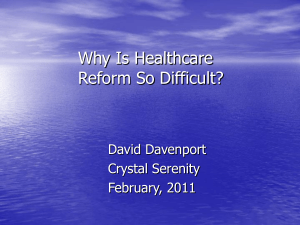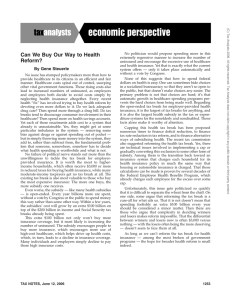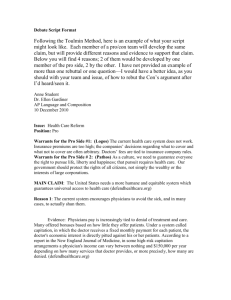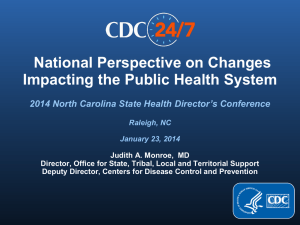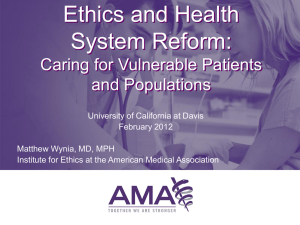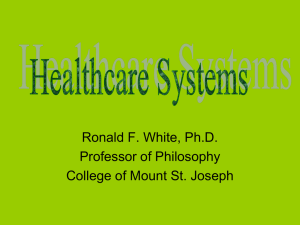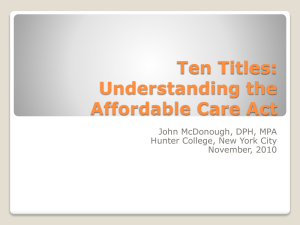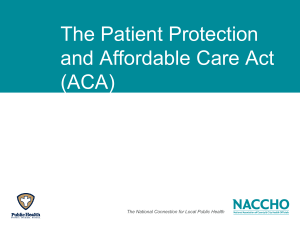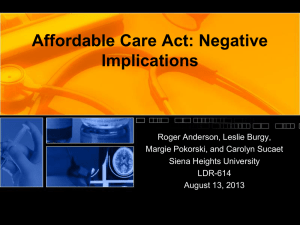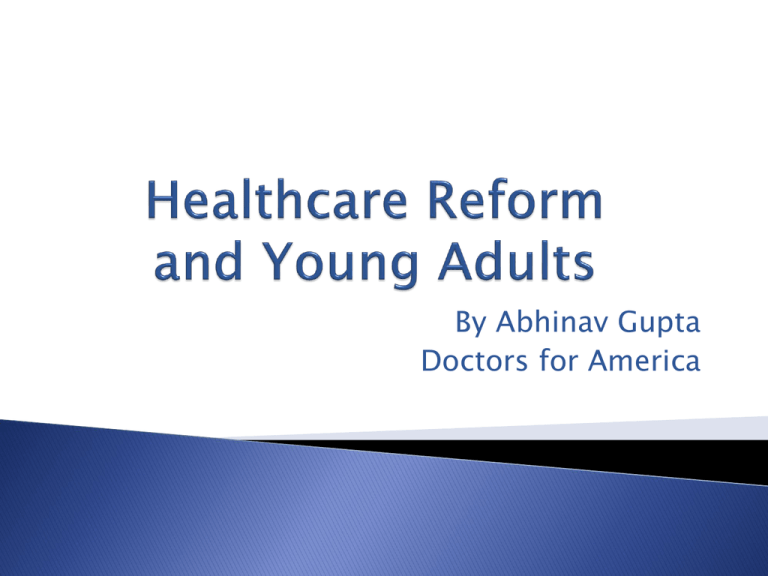
By Abhinav Gupta
Doctors for America
What are problems with
the access to healthcare
for young adults (ages 1929)?
What is the Affordable
Care Act (ACA)?
What does it do for young
adults?
When do measures in the
ACA take effect?
Why it is important for you
to have insurance?
http://www.office.com
Young Adults Aged 19-29
(millions)
15.0
Of uninsured, 2/3 receive “no
usual source of care”
Of uninsured, 1/2 have
problems “paying medical bills”
28.6
Uninsured
Insured
Of uninsured, 2/3 skipped
needed care
Of uninsured, 1/4 carry
medical debt
Cost
◦ Expensive, low salaries
Ineligible for employer-sponsored health
insurance
◦ Part-time, unemployment
No insurance after high school/college
graduation
“Young Invincibles”
◦ Unnecessary care?
1 in 6 suffer from chronic diseases
◦ High blood pressure, cancer, asthma
1 in 10 suffer from a mental health condition
1 in 4 obese
Highest rate of injury-related ER visits
Examples of Hospitalization Costs:
◦
◦
◦
◦
◦
Asthma: $12,496
Fractured Rib: $12,000
Torn ACL: $9,220
Diabetes: $24,843
Delivery: $9,542
Goal: Ensure accessible, affordable, quality
care for all Americans
◦ Coverage to an additional 32 million Americans by
2019
Strict rules on insurance companies to
provide cheaper coverage
Reform hospitals and doctors to provide
better quality care
Funded by various taxes, termination of
subsidies
http://www.futurity.org
Insured as a dependent until age 26
Insurance Regulation
Medicaid Expansion
Online Insurance Market Exchanges and
Insurance Reform
Subsidies for use in Insurance Markets
Reforms to college insurance plans
Coverage for dependents ended after H.S./College
Since 2010, child dependents are allowed to remain on
their parents’ policies until age 26
◦ Over 600,000 have already gained insurance
◦ Affect over 1.7 million by 2013
Individual states have expanded insurance dependency
laws independently
◦ Ex. NJ: 31, FL: 30, NY: 30
◦ Some have specific requirements
Ex. Unmarried, student, same-state residency
Only for fully-insured plans
Federal law of age 26 provides uniform minimum
regardless of state requirements
Ban on discrimination based
on pre-existing conditions
Ban on rescissions
Ban on annual and lifetime
limits
No discrimination based on
sex
◦ Cover maternal and reproductive
health
Small insurance companies
required to spend 80% of
premiums on direct medical
costs (Large companies: 85%)
What’s Medicaid?
◦ Government-sponsored
health insurance program
Covers over 60 million
Americans
Based on poverty levels in
states
Expansion
http://www.iamempowered.com
◦ Increases eligibility to 133%
of federal poverty level
$14,400 for individual;
$29,270 for family of four
◦ Will be enacted in 2014
◦ Effect up to 8 million
uninsured young adults
http://www.healthcare.gov
ACA creates online insurance markets
◦ Ex. Orbitz, Expedia
◦ Compete on price, quality, benefits
Offer bronze, silver, gold, platinum plans
Uninsured individuals will be able to use
markets
Businesses with less than 100 employees
will be able to use markets
◦ Businesses with less than 25 employees receive tax
credits
Subsidies for health insurance if no employer
insurance and between 133% to 400% FPL
◦ $14,400 -$43,000 per year for individuals
◦ $29,326 - $88,200 per year for family of four
Employee will receive federal tax credits based
on a sliding scale
◦ Will pay between 2.0 - 9.5% of income on premiums
◦ Difference between this and “silver” plan cost will be paid by
government
75% young adults below 400% FPL
Insure 5 million young adults
1.6 million young adults
(11% of students) enrolled
in college health plans
Many had low benefits
Discriminated on preexisting conditions, age,
sex
ACA’s effect:
◦ Ban on lifetime limits,
rescissions
◦ Offer coverage to all
regardless of health status
◦ Provide free preventive care
Only for fully-insured
plans
http://www.office.com
The ACA requires all
individuals to be insured
Negate adverse selection
Low-income Americans will
be subsidized by tax
credits or paid for by
Medicaid
High-income Americans
will be rewarded by lower
insurance premiums and
better access to care
Penalty:
◦ $95 or 1% of annual income
◦ 2016: $695 or 2.5% of annual
income
http://www.hetemeel.com
Sep. 23 2010:
◦ Dependents until age 26
Added 600,000 already; projected 1.7 million by 2013
Jan. 1, 2012:
◦ College health plans reform
Jan. 1, 2014:
◦ Expansion of Medicaid
Cover an additional 8 million young adults
◦ Insurance exchanges and tax credits implemented
Cover an additional 5 million young adults
David is a 23-year-old, who
just graduated from college
in May. He landed a job that
does not provide insurance.
He recently fractured a rib.
2009: No insurance. Had to
pay $9,000 for the
emergency room cost.
2014: Eligible to stay on his
parent’s insurance. Left
hospital with only $1,000 bill
for deductible.
Savings: $8,000
Mary is a 27-year-old single
secretary, making $26,000/
year. She does not receive
insurance from her employer.
She wants to buy insurance
because she has asthma.
2009: Estimated health
insurance premium: $3,391
2014: With same premium
($3,391), only responsible to
pay $1,874 (7.5% income) and
receive $1,516 subsidy.
Savings: $1,516 (45% of
premium)
Catastrophic plans
◦ Offer minimal benefits and
deductible of $6,000
Unaffordable, inadequate
preventive and primary care
Some College plans still not
reformed
◦ Self-insured plans
Rising Healthcare Costs
◦ Stay aware of unnecessary
testing, increased costs
◦ Utilize primary care to stay
healthy instead of visiting
emergency rooms
GET INSURED, STAY INFORMED, AND STAY
HEALTHY!
Check out www.gettingcovered.com for more
information.
www.office.com
We need your help to spread the message about
healthcare reform!
To learn more about reform or to get involved,
please visit:
www.drsforamerica.org
Contact us:
Doctors for America
info@drsforamerica.org
202-481-8219
“Young Adults.” http://www.healthcare.gov/foryou/youngadults/top5/index.html,
18 July 2011.
“Reform Explained.”
http://www.younginvincibles.org/HealthCare/reformExplained.html, 15 July 2011.
“What Healthcare Reform Means for Young Adults.”
http://www.nclnet.org/health/70-health-care-reform-/426-what-health-carereform-means-for-young-adults, 15 July 2011.
“Young Adults.” http://www.healthreform.gov/reports/youngadults/index.html,
14 July 2011.
“Focus on Health Reform, May 2010.”
http://www.kff.org/healthreform/upload/8065.pdf, 15 July 2011.
“Realizing Health Reform’s Potential, May 2011.”
http://www.commonwealthfund.org/~/media/Files/Publications/Issue%20Brief/20
11/May/1508_Collins_how_ACA_is_helping_young_adults_reform_brief_v5_CORRE
CTED.pdf, 15 July 20
“Healthcare Reform, The Details.” Presentation by Dr. Howard Forman, Yale
University School of Medicine.

